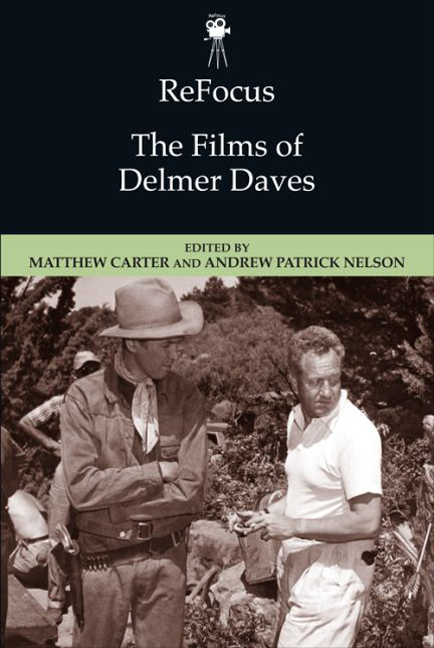Book contents
- Frontmatter
- Contents
- List of Figures
- Notes on Contributors
- Acknowledgments
- Introduction: “No One Would Know It Was Mine”: Delmer Daves, Modest Auteur
- 1 Don't Be Too Quick to Dismiss Them: Authorship and the Westerns of Delmer Daves
- 2 Trying to Ameliorate the System from Within: Delmer Daves’ Westerns from the 1950s
- 3 Bent, or Lifted Out by Its Roots: Daves' Broken Arrow and Drum Beat as Narratives of Conditional Sympathy
- 4 This Room is My Castle of Quiet: The Collaborations of Delmer Daves and Glenn Ford
- 5 Delmer Daves, Authenticity, and Auteur Elements: Celebrating the Ordinary in Cowboy
- 6 Home and the Range: Spencer's Mountain as Revisionist Family Melodrama
- 7 Delmer Daves’ 3:10 to Yuma: Aesthetics, Reception, and Cultural Significance
- 8 Changing Societies: The Red House, The Hanging Tree, Spencer's Mountain, and Post-war America
- 9 Partial Rehabilitation: Task Force and the Case of Billy Mitchell
- 10 “This Is Where He Brought Me: 10,000 Acres of Nothing!”: The Femme Fatale and other Film Noir Tropes in Delmer Daves’ Jubal
- Index
Introduction: “No One Would Know It Was Mine”: Delmer Daves, Modest Auteur
Published online by Cambridge University Press: 15 September 2017
- Frontmatter
- Contents
- List of Figures
- Notes on Contributors
- Acknowledgments
- Introduction: “No One Would Know It Was Mine”: Delmer Daves, Modest Auteur
- 1 Don't Be Too Quick to Dismiss Them: Authorship and the Westerns of Delmer Daves
- 2 Trying to Ameliorate the System from Within: Delmer Daves’ Westerns from the 1950s
- 3 Bent, or Lifted Out by Its Roots: Daves' Broken Arrow and Drum Beat as Narratives of Conditional Sympathy
- 4 This Room is My Castle of Quiet: The Collaborations of Delmer Daves and Glenn Ford
- 5 Delmer Daves, Authenticity, and Auteur Elements: Celebrating the Ordinary in Cowboy
- 6 Home and the Range: Spencer's Mountain as Revisionist Family Melodrama
- 7 Delmer Daves’ 3:10 to Yuma: Aesthetics, Reception, and Cultural Significance
- 8 Changing Societies: The Red House, The Hanging Tree, Spencer's Mountain, and Post-war America
- 9 Partial Rehabilitation: Task Force and the Case of Billy Mitchell
- 10 “This Is Where He Brought Me: 10,000 Acres of Nothing!”: The Femme Fatale and other Film Noir Tropes in Delmer Daves’ Jubal
- Index
Summary
I much prefer the audience not to know that there's a director. That's my general thesis in regard to directing.
Delmer DavesDelmer Daves is the property of those who can enjoy stylistic conviction in an intellectual vacuum. The movies of Delmer Daves are fun of a very special kind. Call it Camp or call it Corn. The director does not so much transcend his material as mingle with it.
Andrew Sarris, The American CinemaAmerican critics have never taken Delmer Daves seriously, and the way things look, they probably never will.
Jean-Pierre Coursodon, American DirectorsIt is tempting, in introducing a book of this nature, to declare at the outset something like, “Delmer Daves is the best filmmaker you've never heard of!” Alas, we cannot resort to such rhetoric—not because Delmer Daves is not a great, critically overlooked filmmaker, but because you likely have heard of him. Daves is remembered principally as a maker of Westerns, and of two Westerns in particular: Broken Arrow (1950) and 3:10 to Yuma (1957). The former, about an Army scout who brokers a peace treaty between the American government and the Chiricahua Apache, offered viewers a comparatively nuanced, sympathetic depiction of Native American culture, and in so doing helped to transform how American Indians are represented in cinema. The latter, a stylish, psychological frontier drama about a poor farmer who agrees to help escort a dangerous outlaw to the train that will take him to prison, is frequently considered among the best Westerns of the 1950s, and was even subject to a high-profile remake in 2007. As these synopses suggest, however, Broken Arrow and 3:10 to Yuma are quite different films, and are remembered for different reasons: the former for its sociocultural significance, the latter for its style. This perceived difference, it turns out, matters a great deal.
Making the jump from discussing individual films to discussing filmmakers normally requires us to detect consistency, not difference. Identifying recurring features of style or theme across multiple films implies the underlying presence of an impelling, organizing personality: an artist who imbues his work with his own vision of the world.
- Type
- Chapter
- Information
- ReFocus: The Films of Delmer Daves , pp. 1 - 47Publisher: Edinburgh University PressPrint publication year: 2016



